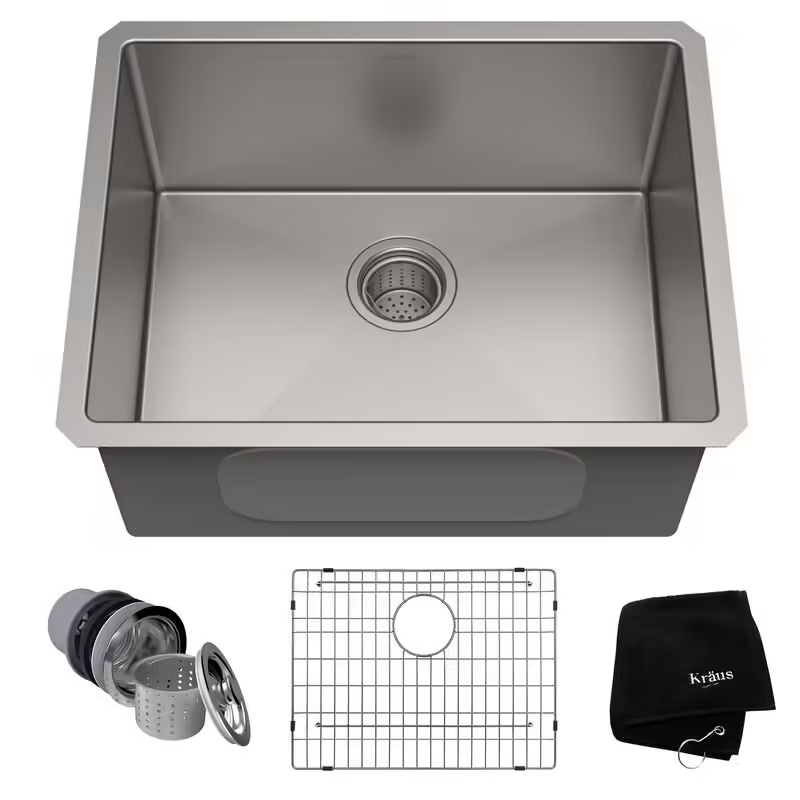The kitchen is often considered the heart of the home, where daily tasks like cooking, cleaning, and socializing come together. Choosing the right fixtures is crucial to both the functionality and aesthetics of this space. One of the most important choices you’ll make is selecting the right sink. A stainless steel sink with an integrated countertop offers the perfect blend of durability, style, and practicality. Whether you’re renovating an existing kitchen or building a new one, this combination can elevate your space in numerous ways.

Why Choose a Stainless Steel Sink with Countertop?
1. Unmatched Durability and Longevity
Stainless steel is renowned for its strength and resilience, making it an excellent choice for high-traffic areas like the kitchen. This material resists rust, corrosion, and staining, which are common concerns for sinks exposed to water and food residues. A stainless steel sink with a built-in countertop ensures that both the sink and countertop endure daily use without compromising on aesthetics. Whether you’re washing dishes, preparing meals, or cleaning up, this combination will hold up beautifully over time, offering years of reliable service.
Unlike other materials that may wear down or discolor with heavy use, stainless steel maintains its sleek and polished appearance for longer. Even in the busiest kitchens, this material is designed to withstand the test of time without losing its charm.
2. Seamless and Elegant Design
A stainless steel sink with an integrated countertop offers a streamlined and cohesive design, contributing to a modern and sophisticated look. The seamless flow between the sink and countertop creates an uninterrupted surface that is both visually appealing and practical. Without seams or crevices, this setup minimizes the opportunity for dirt, moisture, or bacteria to accumulate, making cleaning easier and more efficient.
The sleek, minimalist aesthetic is ideal for those who appreciate modern design. The uniform surface enhances the overall visual appeal of your kitchen, adding a touch of elegance that complements various kitchen styles, from contemporary to industrial. The simplicity of the design is not only visually pleasing but also highly functional for busy kitchens that require both beauty and practicality.
3. Effortless Maintenance
Stainless steel sinks are known for their ease of maintenance. The non-porous nature of the material means that food particles and liquids do not seep into the surface, preventing staining and making it much easier to clean. A quick wipe-down with a soft cloth and a mild cleaner is often enough to keep the sink and countertop looking brand new.
Furthermore, stainless steel is resistant to the buildup of mold, mildew, and bacteria, making it a hygienic choice for kitchens where food preparation and cleaning are constant activities. With regular cleaning and drying, the sink will continue to shine and remain free of stubborn spots or grime.

For homes with hard water, mineral deposits can sometimes leave water spots on surfaces. Fortunately, these deposits are easily removed with a mixture of vinegar and water, helping to restore the sink’s pristine appearance. Unlike other materials, stainless steel is resistant to scratching and discoloration from cleaning products, so you can enjoy a hassle-free maintenance routine.
4. A Perfect Fit for Modern Kitchens
In the age of open-concept kitchen designs and multifunctional spaces, the need for practical yet stylish kitchen fixtures has never been greater. A stainless steel sink with an integrated countertop fits perfectly into modern kitchen layouts, offering a sleek and contemporary look that complements a wide range of other materials and finishes.
Whether you’re working with granite, marble, quartz, or wood, stainless steel blends seamlessly with these surfaces, allowing you to create a cohesive and balanced look. The polished finish of the stainless steel sink adds a reflective quality that enhances the brightness and openness of the space, making your kitchen appear larger and more inviting.
5. Versatility and Functionality
Beyond aesthetics, a stainless steel sink with a built-in countertop offers exceptional functionality. The combination of sink and countertop in one unit maximizes space and provides a continuous, easy-to-clean surface for food prep, washing dishes, or drying utensils.
Many models come with additional features, such as built-in drainboards, multiple basins, or even integrated cutting boards, giving you flexibility to suit your specific kitchen needs. Whether you’re looking for a single basin sink for small tasks or a double basin sink for larger meal preparations, the versatility of stainless steel makes it easy to find a configuration that works for your lifestyle.
For busy families, apartment kitchens, or professional cooking spaces, this combination simplifies kitchen workflows, allowing you to move from prep to clean-up in no time. The added countertop space also provides room for drying dishes, chopping vegetables, or placing hot pans without worrying about damaging surfaces.

Why Choose Us as Your Supplier?
As a trusted supplier of stainless steel sinks and countertops, we are committed to providing high-quality products that combine functionality with style. Our sinks are designed with durability in mind, ensuring they stand up to daily use while maintaining a polished appearance. Whether you’re upgrading your existing kitchen or starting from scratch, our range of stainless steel sink and countertop combinations offers solutions that meet both aesthetic and practical needs.
With a wide selection of sizes and configurations, we offer the perfect solution for any kitchen size or layout. Our expert team is here to help you choose the right sink and countertop combination that will enhance your space and meet your unique requirements.
Conclusion
A stainless steel sink with an integrated countertop is the perfect choice for those looking to upgrade their kitchen with a combination of style, durability, and practicality. From its easy-to-clean surface to its seamless design, this combination provides both aesthetic appeal and reliable performance. Whether you’re cooking, cleaning, or entertaining, a stainless steel sink with a countertop makes every kitchen task easier and more efficient. Choose a premium stainless steel sink and countertop today to enjoy a beautiful, functional, and long-lasting addition to your kitchen.
